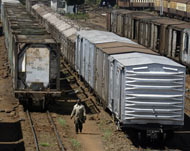Kenyan train’s fate in the balance
A privatisation deal has Kenyan government officials optimistic about restoring the state-owned railroad, dubbed the Lunatic Express, to its former grandeur.

As an engine of the once-proud Kenya Railway chugs through East African darkness, a sleepy bartender rouses himself with a surly belch and scowl in a neglected carriage, and slams a bottle of lukewarm beer on the counter in front of Benjamin Maluva.
Maluva spends many evenings in the bar car of the colonial-era train as it makes the 500km journey from Nairobi‘s rugged, hilly terrain through wildlife-rich plains to Mombasa‘s palm-fringed Indian Ocean shores, and for him the treatment is no great indignity.
The clothes merchant commutes regularly between the capital and his home in Machakos about 60km southeast, and watches grimly as railroad staff lounge on weathered leather benches during his three weekly trips aboard the halting train.
“The train has been taking too much time and time costs us money,” Maluva says, as the cars squeal to a halt for yet another of several lengthy emergency repair stops that can often turn the scheduled 12-hour trip between the capital and the coast into an 18-hour endurance test.
Chorus of complaints
“The workers are lazy and maintenance is bad,” Maluva gripes, adding his voice to a chorus of complaints about the state-owned railroad.
Government officials hope to restore the railroad to its former exotic grandeur with a privatisation deal that has now been blocked by court orders in two countries.
 |
|
The 104-year-old network is run |
Known as the Lunatic Express for its exorbitant construction cost and the perilous dangers of disease and tribal and wildlife attacks its original builders faced in the late 1800s, the 104-year-old Kenya-Uganda Railway has fallen on hard times.
It has been falling deeper into debt and decrepitude as its rolling stock grows rustier by the day and service more sporadic.
With monthly deficits of more than $2.7 million mounting, the Kenyan and Ugandan governments in October announced a plan to turn the cash-depleting venture over to a South African-led consortium for 25 years, beginning in February 2006.
But the concession – under which the Rift Valley Railways Consortium, led by South Africa’s Sheltam Rail Company, is to invest $322 million to improve the fading Lunatic Express – has stalled amid lawsuits from unions and pensioners concerned about job and benefit losses.
Transfer derailed
Earlier this month, judges in Nairobi and Kampala temporarily derailed the transfer pending completion of the lawsuits and urged out-of-court settlements that appear unlikely as the consortium has thus far refused to budge on layoffs and retirement cuts.
 |
|
The train makes a 500km journey |
While the lawyers wrangle, Maluva, his fellow passengers and even some railroad employees wait impatiently for change.
“We are hoping that once privatisation comes through, things are going to improve,” says Maluva, raising his voice to be heard above workers’ slurred complaints about meagre wages and uncertain job prospects given the consortium’s plans to slash the labour force by more than half, from 9500 to 3300.
“We are not breaking even now,” says Jasper Onyango, an engineer keen on the plan and convinced the new owners “will be very generous” with severance packages and retraining for those who lose their jobs.
Others, particularly casual workers hired on daily contracts who make up about 25% of employees, are less certain and say they will probably not fare better than unprotected laborers who died of disease and lion attacks when the railroad was being built.
Workers unpaid
One such worker, a cook who spoke to AFP on condition of anonymity, said: “We haven’t been paid since June.
|
“I’m not scared about whether or not I keep my job, I just want to be paid what I am due” a railway worker |
“We don’t want to work, we just show up hoping we’ll be paid.”
A veteran conductor nods in agreement, lamenting that the lack of wages, coupled with the poor state of repair, has sapped workers’ morale.
“I’m not scared about whether or not I keep my job, I just want to be paid what I am due,” he says, adding that after 30 years of service on the line that is the least he is owed.
Thus, for now, train regulars – passengers and employees – will have to be content with what little the Lunatic Express has to offer.
“One thing I know, Kenya Railways has failed,” says Maluva. “But at least they serve beer.”